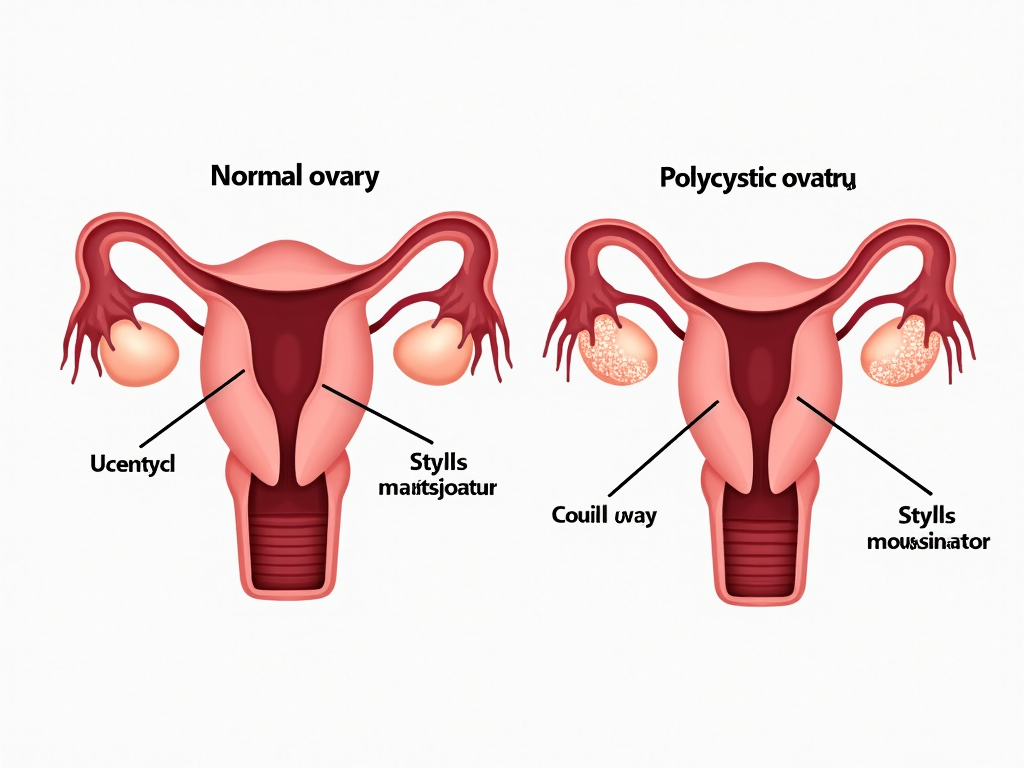PCOS and Fertility: What You Need to Know
March 17, 2025, 7:54 a.m.
Polycystic Ovary Syndrome (PCOS) is a common hormonal disorder that affects millions of women worldwide. It can lead to irregular periods, weight gain, and challenges getting pregnant. This article dives into how PCOS impacts fertility and explores treatments like ovarian stimulation and IVF to help you understand your options.
What is PCOS?
PCOS, or Polycystic Ovary Syndrome, is a condition that changes how a woman’s ovaries function. It’s named 'polycystic' because some women develop many small cysts on their ovaries, though not everyone with PCOS has them. The real issue is a hormone imbalance, with too much androgen (male hormones) and often insulin resistance.
This imbalance causes symptoms that can affect daily life. Here are the most common ones: - Irregular or missed periods - Extra hair growth on the face or body - Acne or oily skin - Weight gain - Thinning hair - Trouble conceiving About 6-12% of women of reproductive age in the U.S. have PCOS, according to the CDC.

Doctors diagnose PCOS by looking at your symptoms, doing blood tests to check hormone levels, and sometimes using an ultrasound to see your ovaries. Knowing you have PCOS is the first step to managing it and planning for your future, including starting a family.
How PCOS Affects Fertility
PCOS often makes it harder to get pregnant because it messes with ovulation. Normally, your ovaries release an egg each month. With PCOS, that process can stop or happen irregularly, leaving no egg for sperm to fertilize.
High androgen levels and insulin resistance can also lower egg quality and affect the uterine lining, making it tougher for a pregnancy to take hold. But here’s the good news: not every woman with PCOS struggles with fertility. Some ovulate normally and conceive without help.

If you’re facing fertility challenges, don’t lose hope. There are ways to boost your chances, from lifestyle tweaks to medical treatments. Understanding how PCOS affects you personally is key to finding the right path forward.
Fertility Treatments for PCOS
If you’re trying to conceive with PCOS, several options can help. Your doctor will consider your health, age, and symptoms to suggest the best approach. Let’s break down the main treatments.
Lifestyle Changes
Simple changes can make a big difference. Losing just 5-10% of your body weight can kickstart ovulation. Focus on eating whole foods like veggies, lean meats, and whole grains, and try activities like walking or swimming to stay active.
Medications
If lifestyle changes aren’t enough, medications can help your ovaries release eggs. Clomiphene citrate (Clomid) tricks your body into making more egg-producing hormones. Letrozole, another option, works similarly but with fewer side effects. Metformin can also help by improving insulin levels.

Ovarian Stimulation
Ovarian stimulation and PCOS go hand in hand for some treatments. Doctors use medications to encourage your ovaries to produce multiple eggs. This is often paired with intrauterine insemination (IUI), where sperm is placed directly in the uterus.
This process needs careful monitoring because women with PCOS can over-respond, leading to ovarian hyperstimulation syndrome (OHSS). OHSS causes swollen, painful ovaries, but doctors adjust doses to keep it safe.
In Vitro Fertilization (IVF)
IVF is a powerful fertility treatment for PCOS. Eggs are collected from your ovaries, fertilized in a lab, and then placed in your uterus. It skips ovulation issues, making it a great option for many.

The Science Behind In Vitro Fertilization
IVF follows a clear process: 1. Stimulation: Medications boost egg production. 2. Retrieval: Eggs are collected with a small procedure. 3. Fertilization: Sperm meets egg in the lab. 4. Growth: Embryos develop for a few days. 5. Transfer: Embryos go into the uterus. For PCOS, doctors tweak the stimulation to avoid OHSS.
Here’s a quick look at fertility treatments:
| Treatment | Success Rate | Side Effects |
|---|---|---|
| Lifestyle Changes | Varies | None |
| Clomiphene | 30-40% | Hot flashes |
| IVF | 40-50% (under 35) | OHSS risk |
Personal Stories and Insights
PCOS and fertility struggles can feel overwhelming. One woman said, 'I thought PCOS meant I’d never be a mom. After months of diet changes and IVF, I held my baby. It was hard, but so worth it.' Her story shows resilience pays off.

A fertility doctor shared, 'PCOS is tricky, but treatable. I’ve seen patients go from despair to joy with the right plan.' These insights remind us that help is out there, and you’re not alone in this.
Tips and Advice
Here’s how to take charge of PCOS and fertility: - Track your cycles: Use an app to spot patterns. - Eat smart: Cut sugar, add fiber. - Move more: Try yoga or a daily walk. - Reduce stress: Relax with deep breathing. - See a specialist: Get expert advice if needed.

Patience is key. Treatments take time, and every step forward counts. Surround yourself with support to stay strong.
Emotional Impact
PCOS can bring anxiety or sadness, especially when fertility is a goal. Talking to a counselor or joining a support group can lift that weight. You deserve to feel hopeful, not just focused on the end result.

Summary
PCOS can complicate fertility, but it’s not the end of the road. With lifestyle changes, medications, or treatments like ovarian stimulation and IVF, many women build the families they dream of. Take it one step at a time, and lean on experts and loved ones for support.